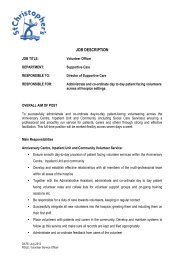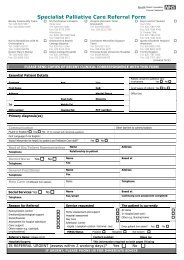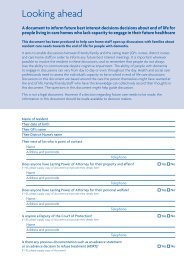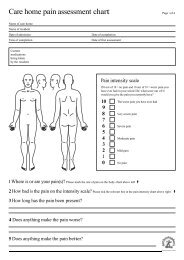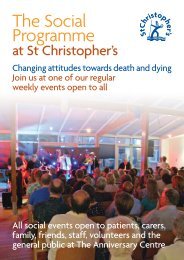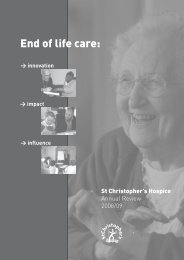Frequently asked questions about blood transfusions
Frequently asked questions about blood transfusions
Frequently asked questions about blood transfusions
- No tags were found...
You also want an ePaper? Increase the reach of your titles
YUMPU automatically turns print PDFs into web optimized ePapers that Google loves.
This leaflet gives<br />
information <strong>about</strong> <strong>blood</strong><br />
<strong>transfusions</strong>. We hope to<br />
answer your concerns by<br />
concentrating on the most<br />
commonly <strong>asked</strong> <strong>questions</strong>.<br />
If you have any more<br />
<strong>questions</strong> please ask your<br />
doctor or nurse.<br />
It is really important for your care<br />
that the information you give us is<br />
as full and accurate as possible.<br />
The National Blood Service (NBS)<br />
The NBS is part of the National Health Service (NHS)<br />
and provides the <strong>blood</strong> that patients receive. In<br />
order to plan for future <strong>blood</strong> demands, information<br />
<strong>about</strong> which patients receive <strong>blood</strong> needs to be<br />
gathered. The NBS may ask an NHS Trust or GP to<br />
provide limited medical information on a sample of<br />
patients who have received <strong>blood</strong> <strong>transfusions</strong>. Any<br />
information that is passed to the NBS is held<br />
securely, with the rights of these individuals<br />
protected under the Data Protection Act.<br />
If you are interested in finding out more <strong>about</strong><br />
<strong>blood</strong> <strong>transfusions</strong> and have internet access, you<br />
might find their website useful – visit<br />
www.<strong>blood</strong>.co.uk. If you do not have internet<br />
access, you can find out more <strong>about</strong> the NBS by<br />
phoning 0845 7 711 711.<br />
INFORMATION FOR<br />
PATIENTS AND CARERS<br />
<strong>Frequently</strong><br />
<strong>asked</strong> <strong>questions</strong><br />
<strong>about</strong> <strong>blood</strong><br />
<strong>transfusions</strong><br />
51-59 Lawrie Park Road, London SE26 6DZ<br />
Telephone 020 8768 4500 Fax 020 8659 8680<br />
www.stchristophers.org.uk<br />
Caritas House, Tregony Road, Orpington BR6 9XA<br />
Telephone 01689 825755 Fax 01689 892999<br />
www.harrishospiscare.org.uk<br />
St Christopher’s Hospice is registered charity 210667<br />
Harris HospisCare is registered charity 1003903<br />
© St Christopher’s Hospice December 2010
1 Who might need a <strong>blood</strong> transfusion<br />
Blood <strong>transfusions</strong> are used to treat anaemia (lack of<br />
red <strong>blood</strong> cells). Anaemia is quite common in people<br />
with cancer and other serious illnesses. It can cause<br />
weakness, fatigue, dizziness and shortness of breath.<br />
A <strong>blood</strong> transfusion may help you with these<br />
symptoms.<br />
2 Are <strong>transfusions</strong> safe<br />
Almost always, yes. The main risk from a transfusion<br />
is being given <strong>blood</strong> of the wrong <strong>blood</strong> group.<br />
A smaller risk is catching an infection. To ensure you<br />
receive the right <strong>blood</strong>, the clinical staff make<br />
careful identification checks before any transfusion.<br />
They will ask you to state your full name and date of<br />
birth. They will regularly monitor you during your<br />
transfusion and ask you how you feel.<br />
In the United Kingdom the authorities take many<br />
precautions to ensure <strong>blood</strong> is as safe as possible:<br />
• all <strong>blood</strong> donors are unpaid volunteers whose<br />
health is carefully checked<br />
• all donors are <strong>asked</strong> a number of <strong>questions</strong> to help<br />
rule out anyone who may pass on an infection<br />
• every donor is tested for certain infections each<br />
time they give <strong>blood</strong><br />
• any donated <strong>blood</strong> that fails these tests is<br />
discarded<br />
• the testing process is checked regularly to make<br />
sure that it meets very high standards.<br />
3 What is the risk of infection<br />
The most important of possible infections are<br />
hepatitis C, hepatitis B and HIV (the virus that causes<br />
AIDS and serious infections).<br />
The risk of catching hepatitis from a <strong>blood</strong><br />
transfusion is very low – <strong>about</strong> one in 900,000 for<br />
hepatitis B and less than one in 30 million for<br />
hepatitis C.<br />
The chance of HIV infection is less than one in<br />
several million. As yet, we don’t know the level of<br />
risk of variant Crentzfeldt-Jakob Disease (VCJD) being<br />
transmitted by <strong>blood</strong>. However, there are rigorous<br />
procedures in place for minimising any risk of<br />
infection.<br />
Thanks to these key measures and others, <strong>blood</strong> is<br />
now safer than ever before. Donated <strong>blood</strong> will be<br />
specially selected to match your own <strong>blood</strong> group.<br />
Fortunately, severe reactions to <strong>blood</strong> <strong>transfusions</strong><br />
are extremely rare but, when they do occur, staff are<br />
trained to recognise them and will give you the<br />
treatment you need.<br />
If you carry a card showing that you have had a<br />
previous reaction to a <strong>blood</strong> transfusion, please<br />
show it to your St Christopher’s nurse.<br />
4 How is <strong>blood</strong> given<br />
It is dripped into a vein, usually in your arm or hand,<br />
using a needle and tubing. One bag of <strong>blood</strong> (a unit)<br />
takes <strong>about</strong> three hours to give (but can be given<br />
more quickly or more slowly if needed).<br />
5 How will I feel during my <strong>blood</strong><br />
transfusion<br />
Most people feel no different at all during their<br />
transfusion. However, some people develop a slight<br />
fever, chills or a rash. These are usually due to a mild<br />
immune reaction or allergy and are easily treated<br />
with paracetamol (Panadol) or by giving the <strong>blood</strong><br />
more slowly. Most people find that it takes a few<br />
days before they feel the full benefit of the<br />
transfusion. The nurses or doctors from<br />
St Christopher’s will check with you whether the<br />
transfusion has helped or not. They will then be able<br />
to advise you regarding future <strong>transfusions</strong>.<br />
6 How long will I need to stay<br />
Most people who have to have a transfusion will<br />
need two to three units of <strong>blood</strong>. This usually means<br />
staying at St Christopher’s overnight.<br />
7 Can I choose whether to have a <strong>blood</strong><br />
transfusion at St Christopher’s or<br />
elsewhere<br />
Yes. You may want to have your transfusion at the<br />
hospital that has been treating you. Your GP or<br />
district nurse can arrange this, as can the nurse from<br />
St Christopher’s.<br />
8 What if I have other worries <strong>about</strong><br />
transfusion<br />
You may be afraid of needles, worried <strong>about</strong> being<br />
squeamish at the sight of <strong>blood</strong> or have had a bad<br />
experience related to a <strong>blood</strong> transfusion. Please tell<br />
your doctor or nurse <strong>about</strong> any concerns you may<br />
have, no matter how small. Our doctors and nurses<br />
will answer your <strong>questions</strong> and talk through any<br />
worries with you or your family or friends. The<br />
St Christopher’s phone number is 020 8768 4500.



